Articles
- Page Path
- HOME > Korean J Community Nutr > Volume 20(1); 2015 > Article
-
Research Article
- Socio-demographic Characteristics, Nutrient Intakes and Mental Health Status of Older Korean Adults depending on Household Food Security: Based on the 2008-2010 Korea National Health and Nutrition Examination Survey
- Yoon Jung Yang
-
Korean Journal of Community Nutrition 2015;20(1):30-40.
DOI: https://doi.org/10.5720/kjcn.2015.20.1.30
Published online: February 28, 2015
Department of Food and Nutrition, Dongduk Women's University, Seoul, Korea.
- Corresponding author: Yoon Jung Yang. Department of Food and Nutrition, Dongduk Women's University, 13 Hwarang-ro, Seongbuk-gu, Seoul 136-714, Korea. Tel: (02) 940-4465, Fax: (02) 940-4193, yjyang@dongduk.ac.kr
Copyright © 2015 The Korean Society of Community Nutrition
This is an Open-Access article distributed under the terms of the Creative Commons Attribution Non-Commercial License (http://creativecommons.org/licenses/by-nc/3.0/) which permits unrestricted non-commercial use, distribution, and reproduction in any medium, provided the original work is properly cited.
- 1,479 Views
- 2 Download
- 25 Crossref
Abstract
-
Objectives
- This study was performed to investigate the associations of food security with socio-demographic characteristics, nutrient intakes and mental health status among older Korean adults.
-
Methods
- This study was conducted using data from the 2008-2010 Korea National Health and Nutrition Examination Survey (KNHANES). Subjects were 4,451 adults aged 65~98 years. Food security was measured using a self-reported question on food sufficiency of subjects' household. Based on the answers, study subjects were classified into secure, mildly insecure, moderately insecure, and severely insecure groups. Dietary intake was estimated by 24-hour dietary recall. Nutrient intake was assessed by dietary reference intakes (DRI). As for mental health status, the data on mental stress, depression, and suicide ideation were used.
-
Results
- Rate of food insecurity in older adults was 14.3%. Old age, being female, low education, low income level, living alone, and discomfort in daily living were more related to food insecurity. Means of nutrient intakes were significantly different according to food security status. Intakes of calcium, potassium, and vitamin B2 were lower than recommended intakes in all groups. Consumption amounts of soy and soybean products, vegetables, mushrooms, fruits, vegetable oils, meats, eggs, seafood, and dairy products were lower in food insecure groups. Mental stress, depression, and suicide ideation were higher in food insecure groups independent of the gender and income level.
-
Conclusions
- These present findings suggested that food security is related to mental health as well as nutrition status in older Korean adults. A national system that include food and psychosocial support programs for the elderly should be considered in order to improve the overall health of older Korean adults.
Acknowledgments
Acknowledgments
- 1. Alaimo K, Briefel RR, Frongillo EA, Olson CM. Food insufficiency exists in the United States: results from the third National Health and Nutrition Examination Survey (NHANES III). Am J Public Health 1998; 88(3): 419-426.ArticlePubMedPMC
- 2. Berkowitz SA, Gao X, Tucker KL. Food-insecure dietary patterns are associated with poor longitudinal glycemic control in diabetes: results from the Boston Puerto Rican Health study. Diabetes Care 2014; 37(9): 2587-2592.ArticlePubMedPMCPDF
- 3. Carter KN, Kruse K, Blakely T, Collings S. The association of food security with psychological distress in New Zealand and any gender differences. Soc Sci Med 2011; 72(9): 1463-1471.ArticlePubMed
- 4. Chinnakali P, Upadhyay RP, Shokeen D, Singh K, Kaur M, Singh AK, Goswami A, Yadav K, Pandav CS. Prevalence of household-level food insecurity and its determinants in an urban resettlement colony in north India. J Health Popul Nutr 2014; 32(2): 227-236.PubMedPMC
- 5. Dewing S, Tomlinson M, le Roux IM, Chopra M, Tsai AC. Food insecurity and its association with co-occurring postnatal depression, hazardous drinking, and suicidality among women in peri-urban South Africa. J Affect Disord 2013; 150(2): 460-465.ArticlePubMedPMC
- 6. Dixon LB, Winkleby MA, Radimer KL. Dietary intakes and serum nutrients differ between adults from food-insufficient and food-sufficient families: Third National Health and Nutrition Examination Survey, 1988-1994. J Nutr 2001; 131(4): 1232-1246.ArticlePubMed
- 7. Drewnowski A, Darmon N. Food choices and diet costs: an economic analysis. J Nutr 2005; 135(4): 900-904.ArticlePubMed
- 8. Facchini LA, Nunes BP, Motta JV, Tomasi E, Silva SM, Thume E, Silveira DS, Siqueira FV, Dilelio AS, Saes MO, Miranda VIA, Volz PM, Osorio A, Fassa AG. Food insecurity in the Northeast and South of Brazil: magnitude, associated factors, and per capita income patterns for reducing inequities. Cad Saude Publica 2014; 30(1): 161-174.PubMed
- 9. Food and Agriculture Organization in the United Nations. The state of food insecurity in the world 2001. Rome: Food and Agriculture Organization in the United Nations; 2002. p. 2-12.
- 10. Franklin B, Jones A, Love D, Puckett S, Macklin J, White-Means S. Exploring mediators of food insecurity and obesity: a review of recent literature. J Community Health 2012; 37(1): 253-264.ArticlePubMedPMCPDF
- 11. Frongillo EA. Validation of measures of food insecurity and hunger. J Nutr 1999; 129(2): 506S-509S.ArticlePubMed
- 12. Hong SA, Kim K. Factors contributing to participation in food assistance programs in the elderly population. Nutr Res Pract 2014; 8(4): 425-431.ArticlePubMedPMC
- 13. Jung SH. The Korean development strategy: Trajectories of the Korean economic development, 1961~2010. J Econ Geographical Soc 2011; 14(4): 453-466.Article
- 14. Kendall A, Olson CM, Frongillo EA. Relationship of hunger and food insecurity to food availability and consumption. J Am Diet Assoc 1996; 96(10): 1019-1024.ArticlePubMed
- 15. Kim K, Hong SA, Kim MK. Nutritional status and food insufficiency of Korean population through the life-course by education level based on 2005 National Health and Nutrition Survey. Korean J Nutr 2008; 41(7): 667-681.
- 16. Kim K, Hong SA, Kwon SO, Oh SY. Development of food security measures for Korean National Health and Nutrition Examination Survey. Korean J Nutr 2011; 44(6): 551-561.Article
- 17. Kim K, Kim MK, Shin YJ. The concept and measurement of food security. J Prev Med Public Health 2008; 41(6): 387-396.ArticlePubMed
- 18. Kim K, Kim MK, Shin YJ. Household food insecurity and its characteristics in Korea. Health Soc Welf Rev 2009; 29(2): 268-292.Article
- 19. Kim MK, Kim TW, Woo SH, Lee SH. Poverty statistics yearbook. Sejong: Korea Institute Health and Social Affairs; 2012. p. 85-91.
- 20. Kwon SO, Oh SY. Associations of household food insecurity with socioeconomic measures, health status and nutrient intake in low income elderly. Korean J Nutr 2007; 40(8): 762-768.
- 21. Lee JS, Frongillo EA. Factors associated with food insecurity among U.S. elderly persons: importance of functional impairments. J Gerontol B Psychol Sci Soc Sci 2001a; 56(2): S94-S99.ArticlePubMed
- 22. Lee JS, Frongillo EA. Nutritional and health consequences are associated with food insecurity among U.S. elderly persons. J Nutr 2001b; 131(5): 1503-1509.ArticlePubMed
- 23. McIntyre L, Williams JV, Lavorato DH, Patten S. Depression and suicide ideation in late adolescence and early adulthood are an outcome of child hunger. J Affect Disord 2013; 150(1): 123-129.ArticlePubMed
- 24. Monsivais P, Drewnowski A. The rising cost of low-energy-density foods. J Am Diet Assoc 2007; 107(12): 2071-2076.ArticlePubMed
- 25. Payab M, Motlagh AR, Eshraghian M, Rostami R, Siassi F. The association of family food security and depression in mothers having primary school children in Ray-Iran. J Diabetes Metab Disord 2014; 13(1): 65.ArticlePubMedPMCPDF
- 26. Seligman HK, Bindman AB, Vittinghoff E, Kanaya AM, Kushel MB. Food insecurity is associated with diabetes mellitus: results from the National Health Examination and Nutrition Examination Survey (NHANES) 1999-2002. J Gen Intern Med 2007; 22(7): 1018-1023.ArticlePubMedPMCPDF
- 27. Seligman HK, Laraia BA, Kushel MB. Food insecurity is associated with chronic disease among low-income NHANES participants. J Nutr 2010; 140(2): 304-310.ArticlePubMedPMC
- 28. Shim JS, Oh K, Nam CM. Association of household food security with dietary intake-Based on the third (2005) Korea National Health and Nutrition Examination Survey (KNHANESIII). Korean J Nutr 2008; 41(2): 174-183.
- 29. Statistics Korea. Korean Statistical Information Service: Population. 2014; cited December 15, 2014]. Available from http://kosis.kr/statisticsList/statisticsList_01List.jsp?vwcd=MT_ZTITLE&parentId=A.
- 30. The Korean Nutrition Society. Dietary Reference Intakes for Koreans. Seoul: The Korean Nutrition Society; 2010. p. 25-419.
- 31. Wunderlich GS, Norwood JL. Food insecurity and hunger in the United States: An assessment of the measure. Panel to Review U.S. Department of Agriculture's Measurement of Food Insecurity and Hunger. Washington: National Academies Press; 2006. p. 2-6.
REFERENCES
Nutrient intakes according to the food security status1)
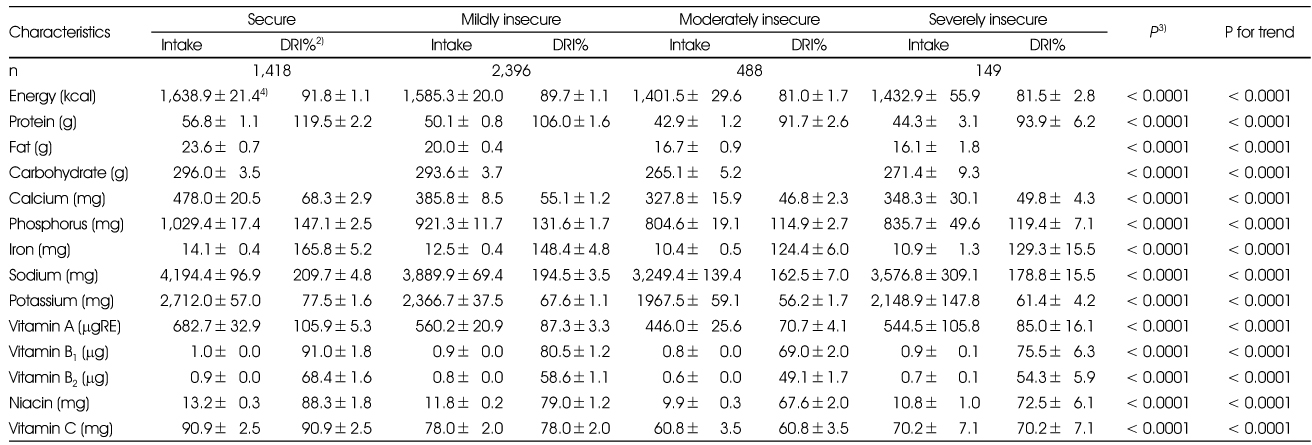
1) Nutrient intakes were estimated by 24-hour recall and nutrient intakes were adjusted by age and sex.
2) Estimated Energy Requirements (EER) for total energy, Recommended Nutrient Intake (RNI) for protein, calcium, phosphorus, iron, vitamin A, vitamin B1, vitamin B2, niacin, and vitamin C, Adequate Intake (AI) for potassium, Recommended daily sodium limit for sodium intake were used as references.
3) P-values by the general linear model (GLM)
4) Mean±SE
Figure & Data
REFERENCES
Citations

- Food insecurity and its associated characteristics of the elderly in Seoul: analysis of the data from the Seoul Food Survey 2023
Hyunjeong Park, Youngmin Nam, Linxi Huang, Youngmi Lee, Jihyun Yoon
Nutrition Research and Practice.2025; 19(1): 117. CrossRef - Prediction model for identifying a high-risk group for food insecurity among elderly South Koreans
Myeunghee Han
Scientific Reports.2025;[Epub] CrossRef - A study on the relationship between food insecurity and periodontitis in Korean adults: the Korea National Health and Nutrition Examination Survey (KNHANES VII) from 2016-2018
Soo-Jin Kang, Jung-Eun Park, Jong-Hwa Jang
Journal of Korean Academy of Oral Health.2023; 47(3): 106. CrossRef - The global burden of suicidal behavior among people experiencing food insecurity: A systematic review and meta-analysis
Mark Mohan Kaggwa, Rita Akatussasira, Firoj Al-Mamun, Sébastien Prat, Mohammed A. Mamun, Isabelle Combey, Felix Bongomin, Sheila Harms, Gary Chaimowitz, Mark D. Griffiths, Andrew T. Olagunju
Journal of Affective Disorders.2023; 342: 91. CrossRef - 광주광역시 서구지역 경로식당 이용 노인의 식품안정성에 따른 식생활 실태연구
지수 백, 영란 허
Korean Journal of Food and Cookery Science.2023; 39(5): 402. CrossRef - Socioeconomic status, food security, and chewing discomfort of Korean elders: results from the Korea National Health and Nutrition Examination Survey
Hye-Sun Shin, Ae-Jung Im, Hee-Jung Lim
Nutrition Research and Practice.2022; 16(1): 94. CrossRef - Food insecurity and associated depression among older adults in India: evidence from a population-based study
Muhammad T, KM Sulaiman, Drishti Drishti, Shobhit Srivastava
BMJ Open.2022; 12(4): e052718. CrossRef - Association of food insecurity with physical frailty among older adults: study based on LASI, 2017-18
T. Muhammad, Priya Saravanakumar, Abhishek Sharma, Shobhit Srivastava, C.V. Irshad
Archives of Gerontology and Geriatrics.2022; 103: 104762. CrossRef - Effects of Perceived Food Store Environment on Malnutrition and Frailty among the Food-Insecure Elderly in a Metropolitan City
Yu-Mi Kim, Narae Yang, Kirang Kim
Nutrients.2021; 13(7): 2392. CrossRef - Comparison of the health and nutritional status of Korean elderly considering the household income level, using the 2018 Korea National Health and Nutrition Examination Survey
Jin Mo Khil
Journal of Nutrition and Health.2021; 54(1): 39. CrossRef - Is It What They Eat or How Much They Eat That Matters More in Adults with Food Insecurity in a Wealthy-Country Context?
Min Gyeong Kang, Sung-Min Yook, Ji-Yun Hwang
Nutrients.2021; 13(3): 851. CrossRef - Health and nutrition intake status of the Korean elderly according to their food security level: data from the 7th Korea National Health and Nutrition Examination Survey (KNHANES VII), 2016–2018
Ahreum Maeng, Jeehyun Lee, Eunju Yoon
Journal of Nutrition and Health.2021; 54(2): 179. CrossRef - Factors associated with bicycle helmet use: A multilevel analysis
Jang-Rak Kim, Euy-Hoon Suh
Korean Journal of Health Education and Promotion.2020; 37(3): 39. CrossRef - The effects of a personalized nutrition intervention program on food security, health and nutritional status of low-income older adults in Seoul city
Yeyeon Lee, Narae Yang, Minjeong Shin, Kyung-Eun Lee, Chang Hee Yoo, Kirang Kim
Journal of Nutrition and Health.2020; 53(4): 416. CrossRef - Gênero, segurança alimentar e nutricional e vulnerabilidade: o Programa das Mulheres Mil em foco
Jussara Maysa Campos, Rita de Cássia Coelho de Almeida Akutsu, Izabel Cristina Rodrigues Silva, Karin Savio Oliveira, Renata Monteiro
Ciência & Saúde Coletiva.2020; 25(4): 1529. CrossRef - Interpersonal and Community Factors Related to Food Sufficiency and Variety: Analysis of Data from the 2017 Community Health Survey
Jiyoun Hong, Taisun Hyun
Korean Journal of Community Nutrition.2020; 25(5): 416. CrossRef - The Association between Food Insecurity and Diet Quality Varies by Race/Ethnicity: An Analysis of National Health and Nutrition Examination Survey 2011-2014 Results
Cindy W. Leung, June M. Tester
Journal of the Academy of Nutrition and Dietetics.2019; 119(10): 1676. CrossRef - Dietary and health characteristics of the young-old and the old-old by food security status: analysis of data from the 6th (2013 ~ 2015) Korea National Health and Nutrition Examination Survey
Ajung Bae, Jihyun Yoon, Soh-Yoon Yun, Kana Asano
Journal of Nutrition and Health.2019; 52(1): 104. CrossRef - Dietary and health characteristics of the young-old and the old-old by food security status: analysis of data from the 6th (2013 ~ 2015) Korea National Health and Nutrition Examination Survey
Ajung Bae, Jihyun Yoon, Soh-Yoon Yun, Kana Asano
Journal of Nutrition and Health.2019; 52(1): 104. CrossRef - Spatial Disparity in Food Environment and Household Economic Resources Related to Food Insecurity in Rural Korean Households with Older Adults
Jae Eun Shim, Seo-jin Kim, Kirang Kim, Ji-Yun Hwang
Nutrients.2018; 10(10): 1514. CrossRef - Dietary intakes of adolescents from food insecure households: analysis of data from the 6th(2013-2015) Korea National Health and Nutrition Examination Survey
Mariam Nakitto, Kana Asano, Injoo Choi, Jihyun Yoon
Nutrition Research and Practice.2017; 11(6): 507. CrossRef - Health and nutritional status of Korean adults according to age and household food security: Using the data from 2010~2012 Korea National Health and Nutrition Examination Survey
Geun Ah Park, Sung Hee Kim, Seok Joong Kim, Yoon Jung Yang
Journal of Nutrition and Health.2017; 50(6): 603. CrossRef - Association of food insecurity and depression in Korean adults
Kowoon Lee, Hye-Sook Yoo
Journal of the Korea Academia-Industrial cooperation Society.2016; 17(1): 62. CrossRef - A study on nutritional intakes in middle income adults based on data from the 5thKorean National Health and Nutrition Examination Survey
Ji-Myung Kim, Hye Sook Kim, Ki Nam Kim
Journal of Nutrition and Health.2015; 48(4): 364. CrossRef - Food Insecurity and Related Risk Factors in the Elderly: Korea National Health and Nutrition Examination Survey 2013 Data
Hye-Sang Lee
Journal of the Korean Dietetic Association.2015; 21(4): 308. CrossRef
- We recommend
- Related articles
-
- Prevalence of coronary artery disease according to lifestyle characteristics, nutrient intake level, and comorbidities among Koreans aged 40 years and older: a cross-sectional study using data from the 7th (2016–2018) Korea National Health and Nutrition Examination Survey
- Ultra-processed food intake and dietary behaviors in Korean adolescents: a cross-sectional study based on the 2019–2023 Korea National Health and Nutrition Examination Survey
- Trends in growth and nutritional status of Korean toddlers and preschoolers: a cross-sectional study using 2010–2021 Korea National Health and Nutrition Examination Survey data
- Biochemical characteristics, nutrient intakes, and chronic disease risk according to the dietary fat energy ratio in middle-aged Korean: a cross-sectional study using data from the 7th (2016–2018) Korean National Health and Nutrition Examination Survey
- Total sugar intake and its contributed foods by age groups in Koreans using the 8th (2019–2021) Korea National Health and Nutrition Examination Survey: a cross-sectional study
Socio-demographic characteristics of the study subjects
1) Analysis of variance (ANOVA) for continuous variables and Chi-square test for categorical variables
2) Mean±SE
3) N (%)
Nutrient intakes according to the food security status1)
1) Nutrient intakes were estimated by 24-hour recall and nutrient intakes were adjusted by age and sex.
2) Estimated Energy Requirements (EER) for total energy, Recommended Nutrient Intake (RNI) for protein, calcium, phosphorus, iron, vitamin A, vitamin B1, vitamin B2, niacin, and vitamin C, Adequate Intake (AI) for potassium, Recommended daily sodium limit for sodium intake were used as references.
3) P-values by the general linear model (GLM)
4) Mean±SE
Food items consumed according to the food security status1)
1) Food consumptions were estimated by 24-hour recall and amount of foods were adjusted by age and sex.
2) P-values by the general linear model (GLM)
3) Mean±SE
Mental Health of the study subjects according to the food security status by the gender
1) P-values by Chi-square
2) N (%)
Mental Health of the study subjects according to the food security status by the income level
1) P-values by Chi-square
2) N (%)
Mental Health of the study subjects according to the food security status by the household type
1) P-values by Chi-square
2) N (%)
1) Analysis of variance (ANOVA) for continuous variables and Chi-square test for categorical variables 2) Mean±SE 3) N (%)
1) Nutrient intakes were estimated by 24-hour recall and nutrient intakes were adjusted by age and sex. 2) Estimated Energy Requirements (EER) for total energy, Recommended Nutrient Intake (RNI) for protein, calcium, phosphorus, iron, vitamin A, vitamin B1, vitamin B2, niacin, and vitamin C, Adequate Intake (AI) for potassium, Recommended daily sodium limit for sodium intake were used as references. 3) P-values by the general linear model (GLM) 4) Mean±SE
1) Food consumptions were estimated by 24-hour recall and amount of foods were adjusted by age and sex. 2) P-values by the general linear model (GLM) 3) Mean±SE
1) P-values by Chi-square 2) N (%)
1) P-values by Chi-square 2) N (%)
1) P-values by Chi-square 2) N (%)

 KSCN
KSCN
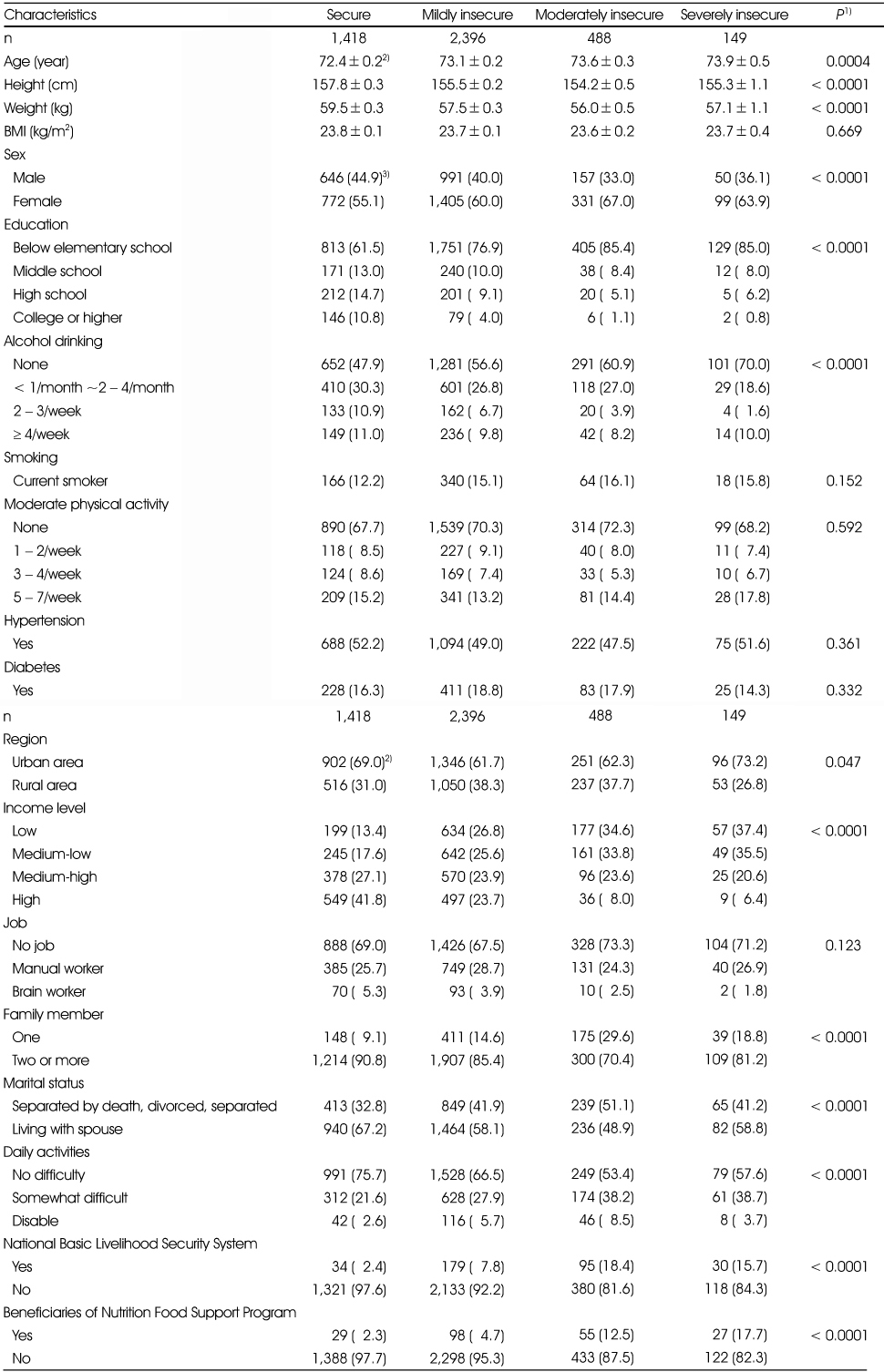
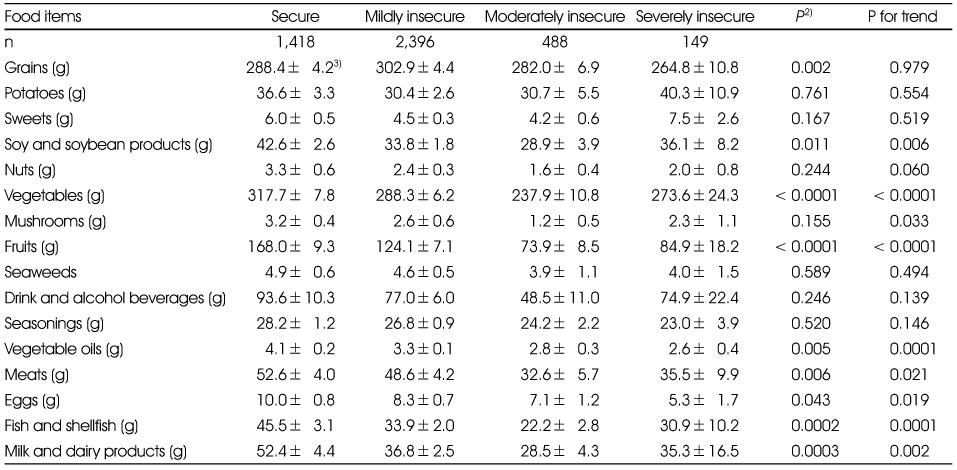
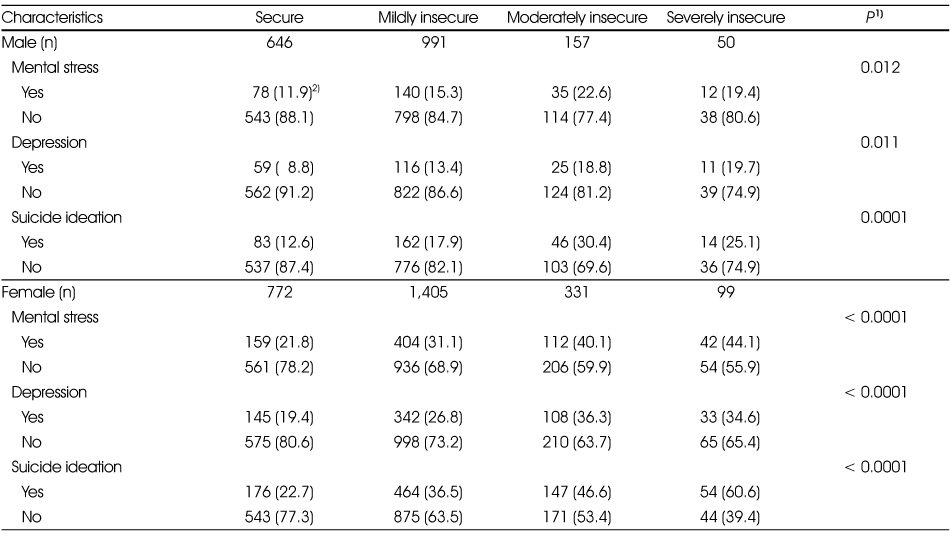
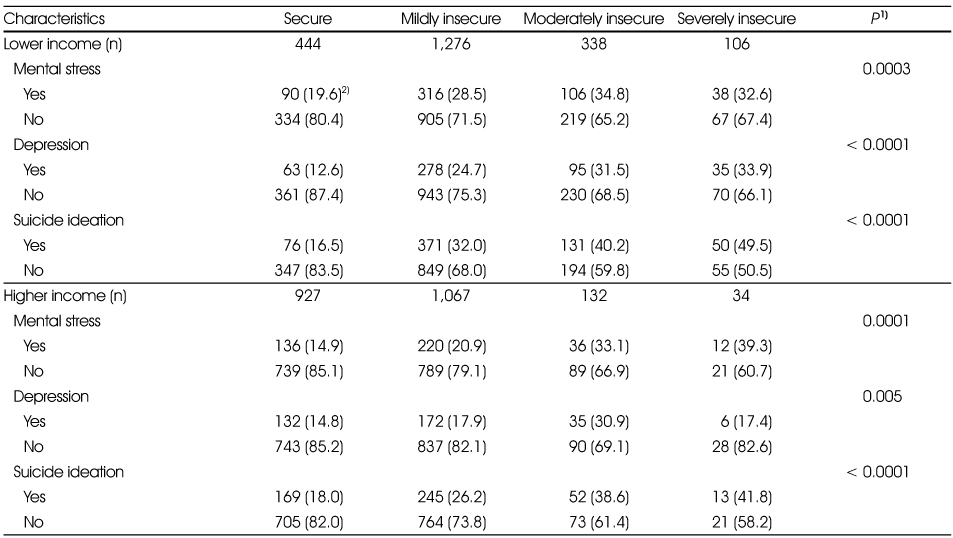
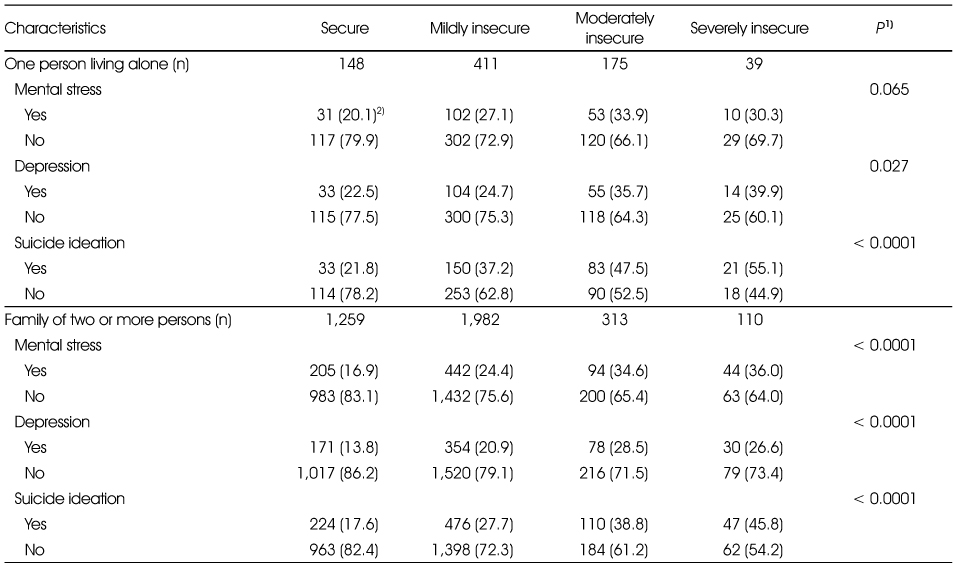
 Cite
Cite


